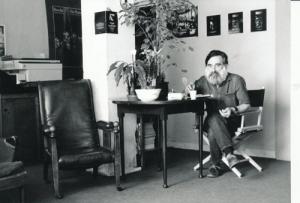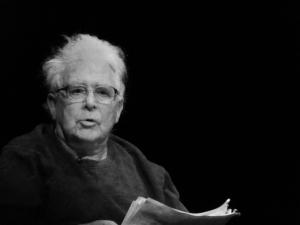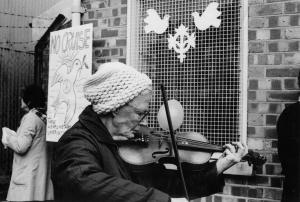We got to know Ian in the early 1990s when starting Women’s Aid to Former Yugoslavia. Ian had co-founded Tantric Technologies in 1989 – a worker’s co-op providing IT services. He – and Clive Debenham, who died last year – helped us become early adopters of the then-new email technology to communicate with women’s and peace groups in the region via the ZaMir network. He also did time in our warehouses, packing and loading aid onto the trucks.
Over the following 20 years, we had…
Obituary
Born in Hull and raised in Hackney, Dai Vaughan was a teenage poet when in 1951 he attended the opening of Britain’s National Film Theatre in London. He recalled: ‘That you could see shots or images as a complex metaphor was a revelation.’
His breakthough as an editor came after working with fellow London Film School alumni Jane Wood and David Naden on Gala Day. Filmed in 1962, using mute hand-held 16mm cameras, Gala Day’s structure and use of unsynchronised sound…
Peace News found itself involved – directly or indirectly – in several of the spate of political trials which were a feature of life in Britain during the 1970s. One of these was the ABC official secrets case; Crispin Aubrey, the 'A' of the trial's name, has died suddenly, aged 66.
Those of us editing PN at the time were hauled up before the lord chief justice for naming an anonymous witness due to give evidence in the ABC case, and both lots of defendants ended up…
John Arden at an 80th birthday tribute in 2010.
John Arden, who died on 28 March at the age of 81, was one of that generation of dramatists, novelists, film-makers and critics who transformed cultural life in Britain in the late 1950s and 1960s. They included, among others, fellow dramatists John Osborne, Shelagh Delaney, Harold Pinter, Arnold Wesker and Brendan Behan; the theatre directors Joan Littlewood and William Gaskill; poets such as Christopher Logue…
My mother Raymonde ‘Ray’ Hainton, peace activist, Quaker and former teacher and medical social worker, died peacefully on 19 February 2012, aged 90.
As a result of her wartime evacuation to Cambridge, she met and married fellow-historian Godfrey Hainton. Ray’s wartime experiences left her with a strong commitment to working for a better world, and she was a campaigner throughout most of her long and active life. After many years of religious uncertainty, she became a Quaker in…
One of the most important poems of the 20th century was Christopher Logue’s “To My Fellow Artists”, first printed in the New Statesman in 1958 and published by Logue as a posterpoem designed by Germano Facetti shortly afterwards. This was followed in the mid-’60s by half a dozen others including “Be Not So Hard”, “London”, “Crime One”, “Goodnight Ladies” and “I Shall Vote Labour”.
Logue took part in the famous International Poetry Incarnation gig at the Albert Hall in 1965 where 7,000…
Frances at USAF Hythe, Southampton, 9 November 1983 when Greenham women set up peace camps at the 102 US bases around Britain, in support of their court case in the US against the siting of cruise missiles in the UK. PHOTO: Paul Carter
Frances MacKeith became a Quaker in the 1960s when she moved to Winchester with her husband Stephen. Here, as a lone ‘peacenik’, she was regarded with a mixture of respect and apprehension as the Peace Woman by a…
Olwen, one of Wales's most committed and colourful peace campaigners, has died in Aberystwyth aged 87.
She was vice-chair of CND Cymru for 20 years, a representative for Wales on the UK CND council, a member of the International Advisory Group, a founder member of Aberystwyth Peace Network, and the powerhouse for the Chernobyl Childrenís Project in mid-Wales.
Olwen thrived on company and she spread cheer. It was this that attracted…
John Hyatt, a member of the Peace News staff collective 1973-75 gave us the slogan “Don't Vote – it only encourages them”.
I first met him as a young man representing the Youth Section of the Peace Pledge Union at the WRI Council meeting in Vienna in August 1968.
Nearby Czechoslovakia was experiencing what turned out to be the last days of the Prague Spring. On the last day of the council meeting a WRI delegation, which I think included John, travelled to Bratislava at the…
Theodore Roszack, historian, novelist, social critic and anti-war activist, was born in Chicago and had an academic career at universities across America.
Of 1964, Roszack wrote: “For those who were part of it, the American peace scene for the years 1963-64, during that paralytic lull following the partial test-ban treaty and preceding the recent, turbulent rise of the ‘New Left’, was rapidly suffocating in pessimism and dismal introspection”. In the summer of ’64 he became editor of…
He was born into a solidly Anglican line of squires, parsons, professors and army officers, and spent happy school holidays in Oxford during and after the First World War.
In 1934, as a young graduate, he sailed to Trinidad to work as an oil refinery operator. Here he met people of Indian descent and found himself identifying with the disadvantaged.
Subsequently, during theological training in Birmingham, he abandoned plans to be a clergyman and instead became a…
Jeffrey Segall was a champion of world peace through a democratically reformed United Nations. Specifically, he was convinced that peace would be possible only when “We, the peoples” have an established place within the UN system alongside our governments.
He came to his passion for peace from a background in medicine and left-wing politics. He was a member of the Communist party in his youth, leaving when disillusioned by the Soviet invasions of Hungary and Czechoslovakia.…
On 10 March, Gene Stoltzfus died in Fort Frances, Ontario, Canada when his heart stopped while he was bicycling near his home on the first spring-like day of the year. He is survived by his wife Dorothy Friesen and many peacemakers who stand on the broad shoulders of his 70 years of creative action.
Gene was the founding director of Christian Peacemaker Teams (CPT), an international faith-based organisation that sends teams of four to eight peacemakers to partner with local…
Five years ago, I went to visit [the former Labour Party leader] Michael Foot, when I was writing a history of CND. He was kind, witty and utterly committed to nuclear disarmament. His vision for nuclear abolition, here and internationally, was far-sighted.
It cannot have been lost on him that many of his views, for which he had been so pilloried in the past, are now common currency at the highest levels and across the political spectrum.
We talked about his role in…
Howard Zinn, US historian and activist, died in January of a heart attack at the age of 87. Perhaps best known as the author who challenged the status quo with A People’s History of the United States, Zinn was at the forefront of the early civil rights movement and anti-war protests against the Vietnam War.
“He was fearless,” Noam Chomsky said. “He said the right things, said them eloquently, and inspired others to move forward in ways they wouldn’t have done, and…




